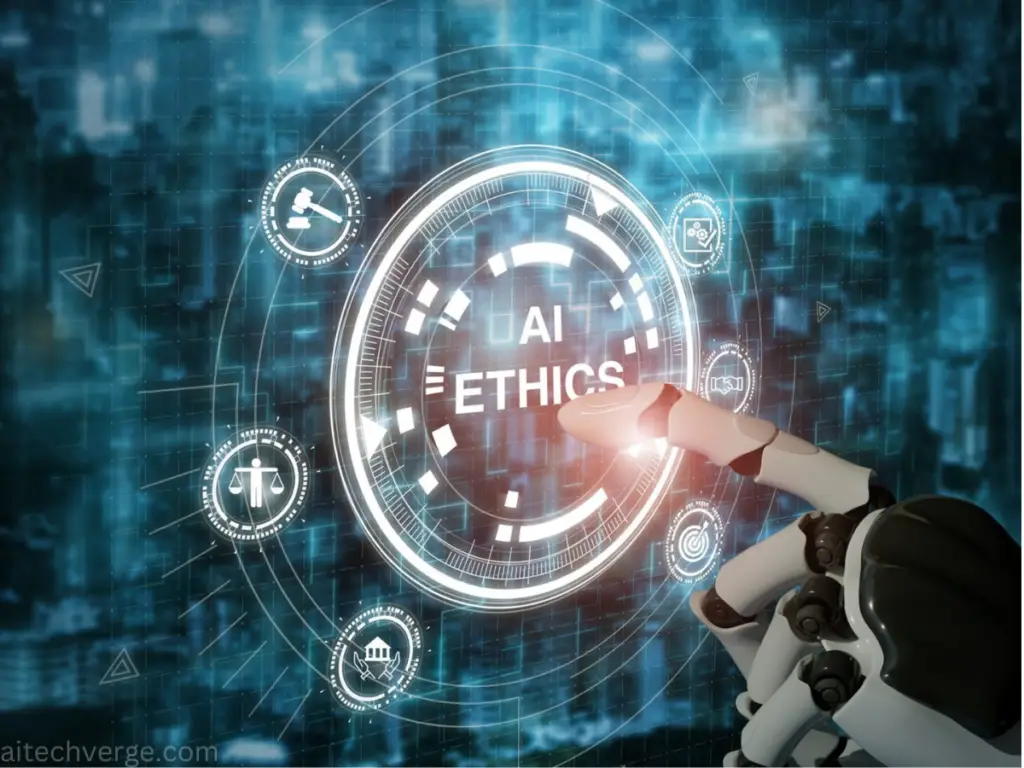“As AI reshapes our world, a critical question arises: what happens when machines make decisions that impact human lives? Without ethical guidelines, AI’s potential benefits may become overshadowed by unintended consequences. Join us on a journey to explore ethics’ vital role in AI development, and discover how responsible innovation can shape a better future for all.”AI ETHICAL COMPANIES
Core Principles Guiding AI Development
As AI becomes increasingly influential, developers must prioritize fundamental principles that align with human values. Two essential principles are:AI ETHICAL COMPANIES
Privacy:
Protect individuals’ personal information and maintain confidentiality, just as you would expect your secrets to be kept safe.
Example: Imagine an AI-powered virtual assistant that only accesses your schedule to schedule appointments, without sharing your details with third parties.
Harm Avoidance:
Design AI systems to prioritize safety and well-being, just as you would want a friend to look out for your best interests.
Example: Picture an AI-driven medical diagnosis tool that accurately diagnoses illnesses and provides empathetic support and resources for patients.AI ETHICAL COMPANIES
Data Stewardship in AI Development
As AI systems rely on data to make decisions, it’s essential to handle this data with care. Responsible data management is critical to preventing harm, maintaining trust, and upholding ethical standards.AI ETHICAL COMPANIES
Data Collection with Purpose:
Collect data only for specified purposes and avoid unnecessary collection.
Example: A fitness tracker should only collect workout data to track progress, not monitor sensitive health information.
Data Protection:
Implement robust safeguards to protect data from unauthorized access or breaches.
Example: A banking AI system should encrypt user data and implement robust security measures to prevent cyber attacks.
Uncovering and Overcoming AI Biases
AI systems can perpetuate harmful biases and stereotypes, perpetuating inequality and discrimination. Identifying and addressing these biases is crucial to creating a fairer future.AI ETHICAL COMPANIES
Data Bias:
AI learns from data, which can contain biases and prejudices.
Example: An AI-powered language translator may struggle to translate languages spoken by marginalized communities, perpetuating language barriers and cultural silos.
Algorithmic Blindspots:
AI algorithms can also introduce biases, even with neutral data.
Example: An AI-driven hiring tool may unfairly dismiss qualified candidates from underrepresented groups, perpetuating workplace homogeneity.AI ETHICAL COMPANIES
Cultivating Diverse AI Development Teams
AI development teams should mirror the diversity of the world they aim to impact. By bringing together individuals from various backgrounds and disciplines, we can create AI that truly serves humanity.AI ETHICAL COMPANIES
Interdisciplinary Collaboration:
Unite experts from fields like sociology, psychology, ethics, and technology to develop AI that considers diverse perspectives.
Example: A team developing an AI-powered education platform included teachers, sociologists, and technologists, resulting in an AI that understood diverse learning needs and cultural contexts.AI ETHICAL COMPANIES
Global Perspectives:
Assemble teams with diverse geographical and cultural backgrounds to develop AI that resonates with people worldwide.
Example: A company creating an AI-driven healthcare tool assembled a team with diverse medical and cultural expertise, ensuring the AI could address healthcare needs across the globe.AI ETHICAL COMPANIES
Human Well-being and Dignity at the Forefront
As AI becomes increasingly intertwined with our lives, we must prioritize human well-being and dignity in its development. This means creating AI that not only serves us but also respects our autonomy, privacy, and individuality.AI ETHICAL COMPANIES
Compassionate AI:
Develop AI systems that understand and respond to human emotions, providing support and resources with empathy and kindness.
Example: An AI-powered chatbot was designed to offer comfort and support to those experiencing grief or loss, providing a listening ear and connecting them with resources and support groups.
Human-Centric AI:
Create AI that prioritizes human agency, autonomy, and privacy, recognizing the inherent value and dignity of every individual.
Example: A healthcare AI system was designed to prioritize patient empowerment, providing personalized health information and resources while respecting patients’ privacy and autonomy.
Illuminating AI Decision-Making Processes
AI systems make decisions that impact our lives, but their processes can be opaque and difficult to understand. Making AI decision-making processes transparent is crucial for building trust and ensuring accountability.AI ETHICAL COMPANIES
Explainable AI:
Develop AI systems that provide clear explanations for their decisions, enabling us to understand the reasoning behind their outputs.
Example: A bank’s AI-powered loan approval system provides transparent explanations for its decisions, helping loan officers and customers understand the reasoning behind approvals or rejections.
Interpretable Models:
Design AI models that are interpretable by humans, allowing us to understand the logic and assumptions behind their decisions.AI ETHICAL COMPANIES
Example: A healthcare AI system’s interpretable model enables doctors to understand how the AI arrived at a diagnosis, facilitating collaboration and building trust in the AI’s decisions.
Real-life examples like these demonstrate the importance of transparent AI decision-making processes. By shedding light on AI’s decision-making processes, we can foster trust, accountability, and collaboration between humans and AI systems.
Ethical Foundations in AI Development
As AI shapes our world, it’s crucial to build AI systems that embody ethical principles and human values. By applying ethical frameworks in AI development, we ensure that AI serves humanity’s well-being and respects human rights.AI ETHICAL COMPANIES
Principled AI:
Develop AI systems that operate on ethical principles like transparency, accountability, and fairness.
Example: An AI-powered legal assistance tool was designed with principled AI, providing transparent and unbiased legal guidance to marginalized communities.AI ETHICAL COMPANIES
Human-Centered Ethics:
Develop AI systems that prioritize human dignity, autonomy, and privacy, respecting the human experience.
Example: A mental health AI chatbot was designed with human-centered ethics, prioritizing empathy and understanding in its interactions with users.
Accountability: The Bedrock of AI Development
As AI systems become increasingly autonomous, it’s crucial to establish clear accountability mechanisms. Accountability ensures that AI developers and deployers are responsible for their creations, fostering trust, safety, and ethical AI development.AI ETHICAL COMPANIES
Clear Lines of Accountability:
Establish well-defined roles and responsibilities for AI development, deployment, and maintenance.
Example: A facial recognition AI developer was held accountable for biases in the algorithm, leading to a redesign that prioritized fairness and equity.
Transparent AI Governance:
Implement transparent AI governance structures that enable tracking and addressing of AI decisions and actions.
Example: A hospital’s AI-powered diagnosis system had transparent governance, allowing doctors to trace and correct AI-driven misdiagnoses.


Pingback: AI ETHIC CONSULTING - aitechverge.com